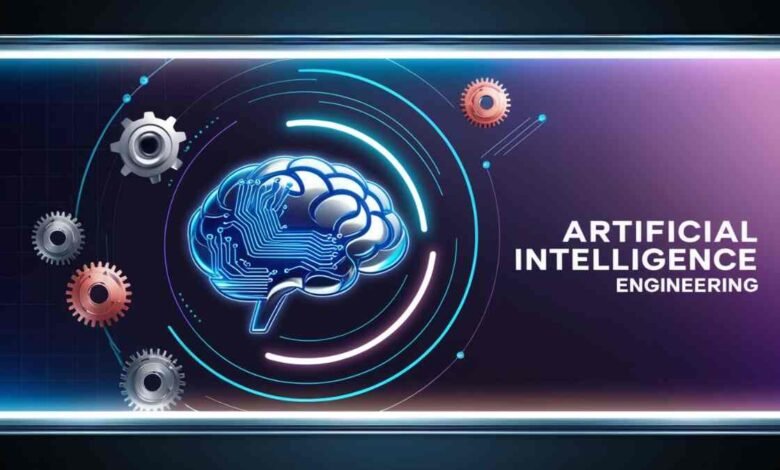Artificial Intelligence Engineering: Ultimate Building AI Systems
Artificial Intelligence Engineering

Artificial intelligence engineering was once considered a fantastical concept and is now deeply ingrained in our everyday lives. Starting from voice-controlled assistants to self-driving vehicles, AI permeates and affects many of our devices and gadgets. Behind all these new applications lies the specialized field of artificial intelligence engineering—a discipline that combines AI principles with engineering techniques for building and optimizing AI systems.
What is Artificial Intelligence Engineering?
AI engineering is the multidisciplinary art of designing, developing, and optimizing AI models and systems. It covers the degrees pertaining to the science of computers, the science of data, and machine learning in order to create a solution that can learn, reason, and make decisions. It plays an integral role in supporting the enhancement of AI usage in industries and organizations so as to deliver efficient and reliable systems.
Core Elements of AI Engineering
Machine learning development
Machine learning is creating algorithms that permit systems to learn and evolve according to data. It forms a backbone for most AI systems, automating processes with high precision and accurately predicting outcomes.
Deep Learning Algorithms
Deep learning makes use of layered neural networks to process complex patterns associated with data. It supports sophisticated solutions, including but not limited to natural language processing, image recognition, and self-driving cars.
Data Science Applications
Data science organizes and analyzes vast data sets, helping AI systems make informed decisions. It is essential for predictive analytics, fraud detection, and personalization.
Understanding Machine Learning Development
Significance of Machine Learning
Machine learning simplifies problem-solving by enabling systems to recognize patterns and improve without manual adjustments. This adaptability is key to creating efficient AI solutions.
Key Tools and Frameworks
Tools such as TensorFlow and Scikit-learn enable the building of strong models while minimizing the efforts towards coding and implementation in machine learning.
Role in AI Systems

Machine learning ensures that the AI systems remain scalable and adaptable so that the businesses are able to meet the dynamic needs of the industry effectively and efficiently.
Deep Learning Algorithms in Action
Importance of Neural Networks
Neural networks mimic the operations of the human brain by processing information hierarchically. They are useful in applications that demand detailed data analysis, such as speech and image recognition.
Common Algorithms
Algorithms such as CNNs operate with visual data, while RNNs are implemented in handling sequential data such as text and time series analysis.
Implementation
Deep learning requires a lot of computations and data, hence very expensive to implement. Resource optimization is therefore important for sustainable use.
Data Science in AI Engineering
Application in Industries
From marketing to healthcare, data science is what drives innovations like customer segmentation, disease diagnosis, and real-time analytics into efficiency and precision.
Predictive Analytics
Predictive analytics makes use of historical data to predict future outcomes, enabling businesses to take informed decisions and prepare to try out the right strategy.
Neural Network Design
Understanding Neural Networks
Neural networks are a series of algorithms designed to recognize relationships in data. Their architecture includes input, hidden, and output layers for data processing.
Innovative Architectures
New architectures like Transformer models enhance natural language understanding, revolutionizing AI applications in chatbots and translation tools.
Applications across Fields
Neural networks support diverse tasks, from autonomous driving to medical diagnostics, demonstrating their versatility and power.
Intelligent Systems Integration
What Are Intelligent Systems?
Intelligent systems make use of AI to process, analyze, and respond to data without human input. They seamlessly integrate into industries to increase their productivity.
Industrial applications
In manufacturing, intelligent systems optimize production lines. In retail, they personalize shopping experiences by creating tailored solutions for users.
Benefits of Integration
The inclusion of intelligent systems increases efficiency, decreases operational costs, and increases customer satisfaction through providing accurate and adaptive solutions.
Applications of AI Engineering
Healthcare Innovations
AI redefines healthcare with predictive diagnostics, treatment personalization, and automation of administrative tasks to improve patient care and operations.
Transformation in Financial Services
Finance: AI systems detect fraud, spot market trends, and automate customer service, leading to smarter decision-making.
Smart Cities and IoT
AI is the driver behind smart city projects by optimizing traffic flow, waste collection, and energy consumption for sustainable cities.
Benefits of AI Engineering
Increased Efficiency
AI automatically executes repetitive tasks, thus saving time as well as resources. It enhances productivity through rapid, complicated computations and analyses.
Cost Savings
AI reduces costs by predictive maintenance and efficient allocation of resources, minimizing manual intervention in business processes.
Enhanced User Experiences
AI tailors the user experiences by analyzing their preferences and delivering recommendations, hence enhancing their engagement in different applications.
Challenges and Ethical Concerns
Data Privacy Problems
AIs depend on massive data, which leaves data security and user privacy issues open. Sensitive information can be protected only by proper safeguards.
Bias in AI Models
Diversity in training data and transparency in design are solutions that mitigate this challenge.
Ethical AI Development
Ethical AI development calls for ideas focused on accountability, fairness, and inclusivity to maintain a balance between technological advancement and societal values.
Future Trends in AI Engineering

Quantum Computing Integration
Quantum computing can be integrated into AI. Therefore, the AI calculations would be accelerated and solve problems that should have traditionally been treated with slow-moving systems.
Focus on Sustainability
AI is used to make best use of resources in energy, agriculture, and environmental conservation.
Democratization of AI
Tools for AI become more accessible, empowering small businesses or even individuals to use AI for innovation purposes.
Conclusion
Artificial Intelligence Engineering is reshaping the world, blending machine learning, deep learning, and data science to create intelligent systems. Its applications span industries, enhancing efficiency and innovation. Despite challenges, its future promises greater accessibility and groundbreaking advancements.
FAQs
What is Artificial Intelligence Engineering?
AI engineering involves designing and building systems that simulate human intelligence using technologies like machine learning and data science.
How is machine learning used in AI?
Machine learning develops algorithms that enable AI systems to analyze data, identify patterns, and make informed decisions on their own.
What are the challenges of deep learning?
Deep learning demands substantial computational resources and data, and thus some of the critical challenges in implementation will relate to scalability and cost.
What industries use AI engineering?
Healthcare, finance, retail, and urban development are sectors that use AI to drive efficiency and productivity as well as improving customer satisfaction.
What is the future of AI engineering?
The future of AI engineering concerns quantum computing, sustainable applications, and democratized AI tools so more people can access them.





